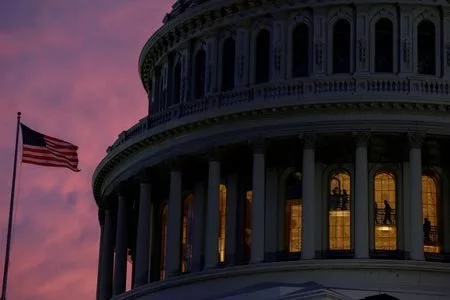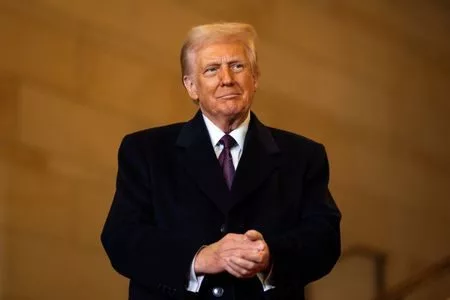By James Oliphant
WASHINGTON (Reuters) – In his inaugural address, President Donald Trump promised a new golden age, casting himself as a uniter. But for a speech that heralded a bright future, it often echoed the past.
Much of Trump’s rhetoric mirrored his words eight years ago, when he was first sworn in as president and spoke about a country with a failing economy and cities torn apart by crime. On Monday, he portrayed himself as a victim of a weaponized justice system under Democratic former President Joe Biden.
Trump said he had a mandate to carry out his vision for the country after winning the popular vote in an improbable political comeback that culminated in his taking the oath of office in the very building his supporters stormed four years ago in a failed attempt to overturn his 2020 election loss.
“From this moment on, America’s decline is over,” Trump said, speaking in the U.S. Capitol Rotunda. “Our golden age has just begun.”
He promised to be “a peacemaker and a uniter.”
Trump, however, then swiftly announced sweeping policy changes on issues that have divided the country. He vowed to end federal diversity initiatives and said he would sign an order declaring that there are only two genders.
He called for a “revolution of common sense” on gender and racial diversity issues as he defines it, one that includes some and excludes others.
He thanked the Black and Hispanic voters who supported his campaign and in honor of Martin Luther King Jr. Day said he wanted to make the slain civil rights leader’s dream a reality.
Trump’s idea of that dream appears to be what he referred to as a “colorblind” America that is a pure meritocracy.
Despite a close popular vote in the 2024 election of just over one percentage point, Trump suggested his victory gave him license to pursue his hard-right policies, while adding that he believes the attempt on his life last year was a matter of divine intervention that further fueled his resolve.
“I was saved by God to make America great again,” Trump said.
After contentious elections, new presidents often moderate their campaign-style rhetoric and drop attacks on their political adversaries. Not Trump.
With Biden seated nearby, Trump tore into the outgoing president’s policies on everything from immigration to foreign affairs. He argued that his win had given him a “mandate to completely and totally reverse a horrible betrayal.”
“It was a campaign speech,” said Lindsay Chervinsky, a historian and executive director of the George Washington Presidential Library. “He blames the same people for the same things. It’s the same grievances.”
Rather than detail a list of lofty objectives for his administration, much of the near-term agenda Trump outlined involved simply reversing Biden-era policies.
Trump did, at times, speak in aspirational terms, referring to the country’s “manifest destiny” and suggesting that he sought to expand its territory.
Trump also called for unity when he first took office in 2017. His subsequent presidency, however, was marked by divisiveness, both in rhetoric and policy.
To move forward, Trump may need to demonstrate in the coming weeks and months that he can let go of the grievances that have fueled him for so long – his two impeachments and his 2020 loss to Biden.
“Over the past eight years, I have been tested and challenged more than any president in our 250-year history,” Trump said. “And I’ve learned a lot along the way.”
Trump didn’t say what he had learned, but in his inaugural speech and two more he gave to supporters over the course of the day, he sounded like the same aggrieved Trump that Americans have come to know well over the years.
(Reporting by James Oliphant; Editing by Colleen Jenkins and Howard Goller)
Brought to you by www.srnnews.com






